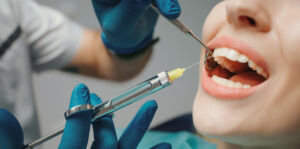As April unfolds, we stand united in observance of the 25th Annual Oral Cancer Awareness Month, a crucial time to shine a spotlight on a silent yet devastating disease.
Did you know that every hour, 24 hours a day, 365 days a year, someone succumbs to oral or oropharyngeal cancer? Despite its alarming prevalence, early detection remains our most potent weapon in combating this insidious illness. This year, an estimated 58,500 new cases of oral cancer will be diagnosed in the U.S.
The grim reality persists: these cancers are often detected late in their development, contributing to persistently high mortality rates. As we embark on this month of awareness, let us redouble our efforts to educate, screen, and advocate for early intervention, paving the way for improved treatment outcomes and saving lives.
Signs indicative of oral cancer, often linked to tobacco and alcohol usage, may include persistent sores, abnormal discoloration of soft tissues, bleeding, or hard lumps in the mouth. Conversely, oropharyngeal cancer, potentially caused by HPV16, may present symptoms such as persistent sore throat, swollen tonsils, or difficulty swallowing. These persistent symptoms, irrespective of their cause, warrant immediate attention.
Furthermore, understanding the risk factors associated with oral cancer is crucial. While historically prevalent among heavy drinkers and smokers over 50, the rising incidence among nonsmokers due to HPV infection underscores the evolving landscape of the disease. Approximately 99 percent of HPV oral infections resolve spontaneously, yet in some cases, the virus persists, potentially leading to cancerous growths. This underscores the importance of regular oral cancer examinations, especially during Oral Cancer Awareness Month in April.
Throughout April, dental professionals nationwide will offer free screenings to underscore the Oral Cancer Foundation’s website significance of early detection in mitigating mortality and treatment-related complications. Visit the Oral Cancer Foundation’s website for a comprehensive list of participating dental professionals and to access valuable oral cancer awareness, diagnosis, and treatment resources. Let us unite in our commitment to raise awareness, promote early detection, and empower individuals to prioritize their oral health.
Schedule your screening!




